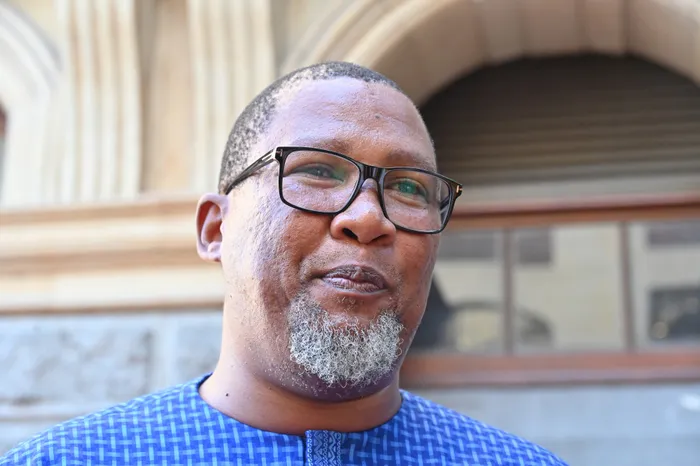'The struggle continues' — Mandla Mandela marks Heritage Day at sea on way to Gaza

Mandla Mandela said: "The struggle for freedom is my heritage."
Image: Ayanda Ndamane/independent Newspapers
Far from home, on a vessel en route to Gaza, the late Nelson Mandela’s grandson, Mandla, marked Heritage Day in a way few South Africans did.
Much of the country celebrated with braais, family and good cheer.
Mandla instead followed in his grandfather’s footsteps on Wednesday, travelling to the same place the former president visited in 1995.
During that 1995 visit, Mandela voiced solidarity with the Palestinian cause, saying “our freedom is incomplete without the freedom of the Palestinian people".
“This is where I celebrated Heritage Day this year,” Mandla said.
“And the struggle for freedom is my heritage.”
Heritage Day, held every year on September 24, is a public holiday in SA to celebrate the rainbow nation's diverse cultures, traditions and shared history.
Speaking from the Global Sumud Flotilla, Mandla told IOL it was an honour to carry the baton passed down by his grandfather.
The Global Sumud Flotilla is a coalition of civilian vessels seeking to break the Israeli blockade of Gaza and deliver humanitarian aid.
“My grandfather was never overwhelmed regardless of the enormity of the challenges we faced as a family and as a nation at the height of the apartheid era,” the 51-year-old said.
“Today, as we look back over three decades of democracy, it is easy to see the gargantuan challenges that we face.
"Heritage is about celebrating the journey covered, planning the road ahead and dreaming about what we leave for posterity.
"The struggle continues.”
Mandla said his understanding of heritage had deepened with time.
“We honour the villages that gave birth to us and shaped the values that have made us,” he said.
“It is these values that shaped the continuum of our heritage, that made us who we are and informed our daily struggles and lived experiences.”
As a traditional leader, he said he felt the weight and responsibility of preserving heritage.
“There were moments when we confronted the impact of colonisation on traditional life and the struggle to defend what is our birthright,” he said.
“That struggle carried into systems and power structures that largely displaced traditional governance.
"When we saw unequal development, especially in rural areas, it connected us to the pain and suffering of our people.
"Heritage was alive in the struggles we waged to shape the world we bequeathed to posterity.”
He also reflected on the dangers of forgetting history.
“Heritage is memory, and society selects the narratives it wants to tell,” Mandla said.
“Many aspects of our African heritage have been erased or consigned to the dustbin of history.
"Few can speak of their history beyond a generation or two ... those who forget their history will be forgotten by history.”
Passing lessons to younger generations was vital, he said.
“Ours is primarily an oral tradition, with stories, indigenous knowledge, values and culture passed from generation to generation.
"Technology can help support this for our children and younger generations,” he said.
On the state of SA, Mandla said: “We celebrated our constitutional democracy and the gains of the past 31 years.
"The values and vision of my grandfather were enshrined in the Constitution, the Freedom Charter and our National Democratic Revolution.
"Yet there is much that remains to be addressed.
"We must eradicate poverty and inequality, create jobs, fight crime and corruption, and build a national consciousness that cares for the most vulnerable.
"That is the unfinished business of our democracy.”
Heritage, he said, was also reflected in culture and sport, though challenges remained.
“Sports have been a great unifier, but the administration of sporting codes struggled to address past injustices.
"Grassroots control remained largely untransformed.
"We could not fully celebrate heritage while traditional leaders and governance systems remained marginalised,” he said.
Mandla said ordinary South Africans played a vital role in keeping heritage alive.
“As long as we held onto our values, there was hope. We owed it to posterity to preserve what had been handed down and pass it on,” he said.
Politics, he admitted, always loomed large.
“They were always overwhelming in SA, whether inter-party or intra-party.
"We all had to stand firm in defence of our heritage to overcome these challenges.”
For Mandla, heritage was also personal.
“I celebrated heritage daily by living consciously and encouraging others to do the same.
"I acknowledged the baton handed to me and lived knowing that one day I shall hand over the same baton to posterity,” he said.
His message to young South Africans was simple.
“Never give up. SA is your heritage in all its glory and diversity. Own it and tell your own story,” he said.
He recalled how his family’s story carried lessons about heritage and survival.
“My great grandfather, Nkosi Mphakanyiswa Gadla Mandela, was deposed as chief of Mvezo, robbed of his land and cattle, and banished to Qunu by colonial powers.
"This led to my grandfather being raised in the household of the regent Nkosi Jongintaba Mtirara.
"This story came full circle with my coronation as traditional leader of the Royal House of Mandela and Mvezo Traditional Council in 2007, restoring our proud heritage.”
Related Topics: